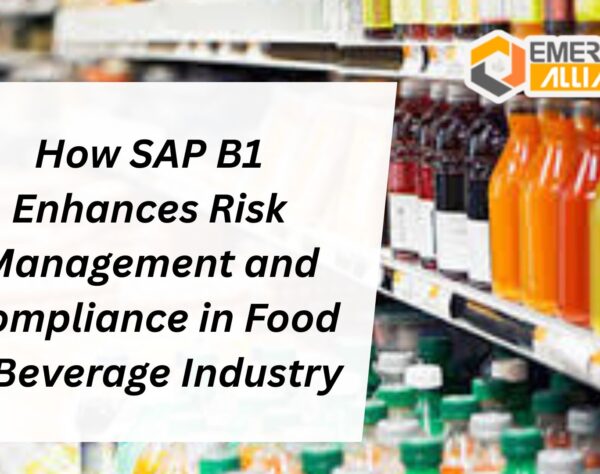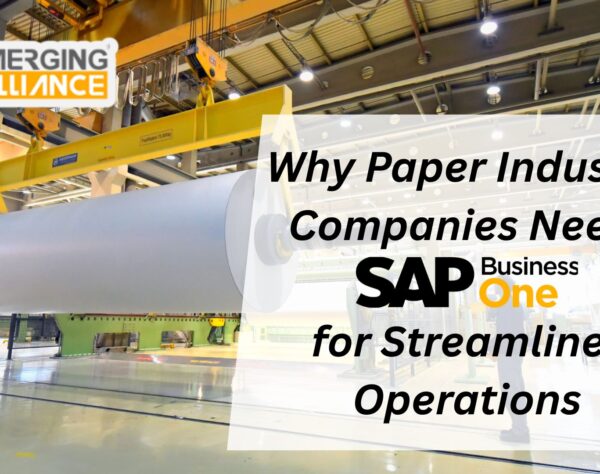
Solving Chemical Fertilizer Industry Challenges with SAP Business One

Key Features of SAP B1 ERP for Fertilizer Manufacturers
The chemical fertilizer industry plays a crucial role in global agriculture by supplying essential nutrients for crop growth. Yet, it faces challenges such as volatile raw material costs, strict compliance requirements, and complex inventory and distribution processes. To remain competitive, many businesses are adopting advanced SAP ERP Solutions like SAP Business One. As a trusted SAP Business One Partner, we explore how the SAP Business One ERP Solution is transforming operations in the chemical fertilizer sector through smarter resource planning, regulatory compliance, and supply chain visibility powered by SAP methodology.
What is SAP Business One ERP (SAP B1 ERP Solution)?
SAP Business One is a fully integrated SAP ERP solution built for small to medium-sized enterprises (SMEs) across diverse sectors. This SAP Business One software streamlines operations by automating key functions like finance, inventory, procurement, and sales. With real-time insights from the SAP Business One Application, businesses can make data-driven decisions, improve efficiency, and accelerate growth.
When customized for the chemical fertilizer sector, the SAP B1 ERP Solution delivers industry-specific advantages. From strengthening supply chain control to ensuring regulatory compliance and enhancing inventory accuracy, the SAP Business One Solution empowers businesses to overcome challenges and secure long-term success with trusted SAP methodology.
Key Challenges in the Chemical Fertilizer Industry
Before diving into the benefits of SAP B1 for Chemical Fertilizer Industry, it’s essential to understand the common challenges faced by businesses in this sector:
- Complex Supply Chain Management: The chemical fertilizer industry deals with numerous suppliers of raw materials, fluctuating prices, and a wide distribution network. Efficiently managing this complex supply chain can be difficult without a centralized system.
- Inventory Management: Fertilizer products often have long shelf lives but may need to be produced in large quantities to meet seasonal demand. Keeping track of stock levels, optimizing production schedules, and avoiding stockouts or overstocking can be overwhelming.
- Regulatory Compliance: The chemical fertilizer industry is heavily regulated. Companies must adhere to safety standards, environmental regulations, and quality control measures, all while maintaining accurate records and ensuring traceability.
- Cost Management: Raw material costs in the fertilizer industry can be volatile. Efficient cost tracking, budgeting, and financial forecasting are essential to stay profitable in such a dynamic market.
- Sustainability: As environmental concerns grow, the fertilizer industry is under increasing pressure to adopt sustainable practices, such as reducing the carbon footprint of production processes or transitioning to more eco-friendly products.
How SAP B1 Solves These Challenges for the Chemical Fertilizer Industry
1. Streamlining Supply Chain Operations
SAP B1 Solutions for the Chemical Fertilizer Industry empower businesses to manage their supply chains with greater efficiency. The SAP Business One ERP integrates every stage—from procurement and production to distribution—into a single, unified system. With complete operational visibility through the SAP Business One Application, companies can:
- Track raw materials in real-time, optimizing purchasing decisions and reducing the risk of supply shortages.
- Automate purchase orders and supplier invoicing, saving time and reducing manual errors.
- Monitor supplier performance to ensure that high-quality raw materials are consistently delivered on time.
These capabilities enable companies to keep production costs in check while ensuring that they can meet demand without overstocking or understocking.
2. Optimizing Inventory Management
Inventory management is crucial in the fertilizer industry, given the high value of raw materials and the need for precision in production schedules. SAP Business One simplifies inventory management by offering real-time tracking and automated processes. Key features include:
- Batch and serial number tracking: This ensures that products can be traced from raw material to finished goods. This is particularly useful for adhering to quality control standards and regulatory compliance.
- Real-time stock visibility: With SAP B1, companies can access real-time data on stock levels, sales, and production status. This ensures that fertilizer companies can accurately forecast demand and adjust inventory levels accordingly.
- Automated stock reordering: SAP B1 can be set to automatically reorder stock based on predefined thresholds, preventing stockouts and minimizing the need for manual intervention.
By improving inventory management, SAP Business One helps businesses reduce waste, improve stock rotation, and optimize production cycles.
3. Ensuring Regulatory Compliance
The chemical fertilizer industry is subject to strict regulations related to safety, environmental impact, and product quality. SAP Business One for Chemical Fertilizer Industry streamlines compliance by automating record-keeping, reporting, and quality control processes. Features such as:
- Document management: SAP B1 stores all critical documents, certifications, and records in one place, making it easier to track and retrieve information for audits or inspections.
- Quality control modules: With SAP B1, companies can set up quality checks at various stages of production, ensuring that each batch of fertilizer meets regulatory standards.
- Regulatory reporting: The system can automatically generate compliance reports and help companies stay up to date with changing regulations.
This ensures that companies in the chemical fertilizer industry can maintain consistent product quality and avoid costly fines or penalties.
4. Improving Financial Management and Cost Control
Given the volatility of raw material prices and the complex nature of fertilizer production, effective financial management is critical. SAP B1’s comprehensive financial management features help businesses in the fertilizer industry streamline budgeting, financial forecasting, and cost analysis. Key financial features include:
- Real-time financial data: SAP Business One provides up-to-date financial information, enabling businesses to track expenses, monitor cash flow, and make informed decisions.
- Cost tracking by production batch: SAP B1 enables businesses to track production costs by batch, helping them pinpoint inefficiencies and optimize production processes.
- Financial reporting: With built-in financial reporting tools, companies can generate reports that provide insights into profit margins, cost trends, and pricing strategies.
By enabling better financial visibility and control, SAP B1 for Chemical Fertilizer Industry helps businesses reduce waste, optimize costs, and improve profitability.
5. Enhancing Sustainability Practices
Sustainability is becoming a key driver in the chemical fertilizer industry, as consumers and governments alike are demanding greener practices. SAP B1 helps businesses adopt more sustainable practices by:
- Tracking energy consumption and carbon footprint: By monitoring energy usage and emissions, businesses can take steps to reduce their environmental impact.
- Optimizing production processes: SAP B1 can help optimize fertilizer production by identifying waste and inefficiencies, leading to more sustainable manufacturing practices.
- Supporting green product lines: As companies move towards eco-friendly fertilizers, SAP B1 can help manage the production of these products, track certifications, and maintain transparency in the supply chain.
By leveraging SAP B1 sustainability features, businesses can not only comply with environmental regulations but also cater to the growing consumer demand for eco-friendly products.
Why Choose SAP Business One for Chemical Fertilizer Industry?
The SAP Business One implementation for the Chemical Fertilizer Industry delivers substantial benefits through the SAP Business One ERP Solution:
- Improved Operational Efficiency: With automation and streamlined processes, companies can reduce manual work, eliminate errors, and enhance productivity.
- Increased Visibility: Real-time data and analytics give businesses the insight they need to make faster, more informed decisions.
- Scalability: As your business grows, SAP B1 grows with you, offering the flexibility to scale operations without compromising performance.
- Cost Savings: By optimizing supply chain management, inventory control, and financial forecasting, businesses can reduce costs and improve profitability.
- Regulatory Compliance: SAP B1 ensures that your business adheres to industry regulations and maintains high-quality standards, reducing the risk of fines or product recalls.
Final thoughts
SAP B1 solutions for Chemical Fertilizer Industry is a powerful ERP solution that helps businesses streamline operations, manage complex supply chains, improve inventory control, and enhance regulatory compliance. With its customizable features, real-time insights, and scalability, SAP Business One is transforming the way companies in the fertilizer industry operate, enabling them to remain competitive in a rapidly evolving market.
By integrating SAP B1 into your operations, your business can achieve greater efficiency, improve financial management, and drive sustainable growth in the chemical fertilizer sector. If you’re ready to unlock the full potential of your business, SAP B1 is the key to success.
FAQs
1. What is SAP Business One and how does it help chemical fertilizer manufacturers?
SAP Business One ERP is a unified system that automates key operations like procurement, inventory, and distribution. It helps chemical fertilizer manufacturers improve efficiency, ensure compliance, and make data-driven decisions.
2. Why is SAP B1 ERP Solution ideal for the chemical fertilizer industry?
The SAP B1 ERP Solution addresses sector-specific challenges like hazardous material tracking, cost control, and compliance. It improves workflow integration and overall operational visibility.
3. How does SAP Business One improve supply chain management?
SAP Business One software offers end-to-end supply chain control—connecting procurement, production, and logistics for faster, more accurate, and streamlined operations.
4. Can SAP Business One help with regulatory compliance in the fertilizer industry?
Yes, SAP Business One Application includes tools for traceability, documentation, and automated reporting, helping fertilizer companies stay compliant with environmental and government standards.
5. What inventory management features does SAP Business One offer for this industry?
SAP Business One ERP provides real-time inventory tracking, automated restocking alerts, and batch-level traceability—ensuring accurate stock control and reduced losses.
6. How does SAP methodology benefit chemical fertilizer companies?
SAP methodology ensures structured implementation with minimal disruption. It uses best practices for faster go-live, better customization, and long-term ERP success.
7. Is SAP Business One Cloud available for remote operations?
Yes, SAP Business One Cloud supports remote access to all business functions, enabling teams across multiple locations to collaborate in real time.
8. Can SAP B1 integrate with production machinery or lab systems?
Yes, SAP Business One ERP Solution can integrate with lab tools and manufacturing systems for automated data exchange and better production control.
9. How does a SAP Business One Partner support implementation and training?
A SAP Business One Partner handles everything from ERP setup and customization to user training and ongoing SAP B1 support tailored to business needs.
10. What is the ROI of SAP Business One for the chemical fertilizer industry?
SAP B1 Solutions reduce costs, improve resource use, and enhance decision-making—leading to better profitability and operational growth over time.
Ready to transform your fertilizer business? Get expert SAP Business One guidance today!







